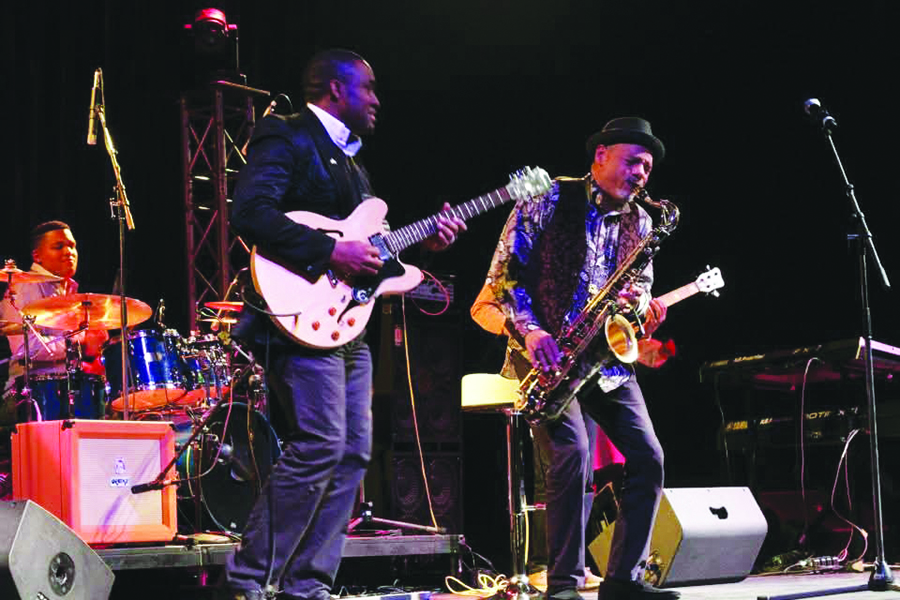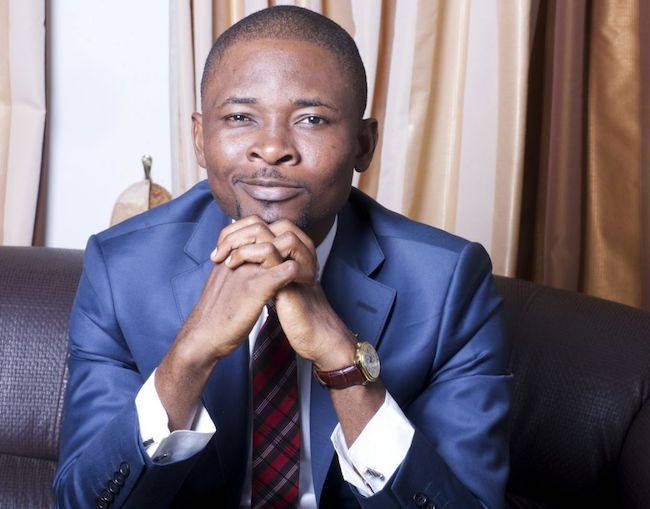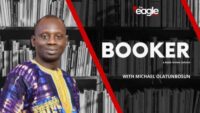Fire Reigniting African Jazz
In a world tuned to the algorithmic tempo of instant fame, Kunle Ayo plays a different rhythm —one that echoes across continents, rooted in tradition yet alive with reinvention. With calloused fingers and a soul steeped in ancestral sound, the Nigerian-born, South Africa-sculpted guitarist returns home briefly not in nostalgia, but in quiet triumph to stage concerts and tours. His new album, Inner Reflections, is more than music; it is a reckoning, a return, a renaissance. As African jazz stirs anew, Kunle emerges not as a relic of the genre’s golden age, but as its luminous compass—bridging past and present, Lagos and Johannesburg, memory and melody, writes Adedayo Adejobi
I
n the honeyed twilight of a Lagos evening, the air hums with possibility. Somewhere in the heart of the city, Trib3 Lagos in Victoria Island, a guitar case snaps open and fingers, long steeped in sun-drenched South African jazz, pluck out the first few notes of something old, yet unmistakably new. The man behind the music is Kunle Ayo—a name whispered in reverence across African jazz circles and now, finally, re-echoing on Nigerian soil.
After decades of cultivating his craft in the rhythmic cradle of Johannesburg’s African jazz scene, Kunle Ayo returns to stage concerts and tours—not as a prodigal son, but as a patriarch of pan-African sound, bearing gifts of sonic reflections and a legacy in bloom.
“Nigeria never left me,” Kunle tells me, seated under the soft lights of Trib3 Lagos, an artistic haven. His voice is textured, like the grain of mahogany. “Even when I was playing Cape Town stages or producing records in Johannesburg, I was always playing for home.”
In the kaleidoscopic theatre of African jazz, few figures have wielded the guitar with such contemplative eloquence and incandescent grace as Kunle Ayo. He does not play his instrument so much as converse with it, as though translating ancestral memory into melody, measured, honey-toned, and saturated with emotional freight.
But it is not merely his fingers that summon reverence. It is his journey: one that arcs from the vibrant disorder of Lagos to the jazz-slick streets of Johannesburg and, with a kind of mythic inevitability, curves homeward again.
At 52, Kunle Ayo stands not at a career summit, but at a threshold—a moment ripe with return, renewal, and redefinition.
His most recent album, “Inner Reflection,” is not simply an addition to his discography; It is a spiritual manifesto disguised as sound; a project steeped in legacy and laden with the textures of a man confronting himself and his homeland anew.
Coming back to Nigeria wasn’t about nostalgia,” Kunle tells me in a quiet corner of the Lagos Lounge, his tone equal parts contemplative and amused.
“For me, it was about accountability. You reach a point where you must bring the fire back to where it was first lit.”
To understand Kunle Ayo’s present, one must rewind to the Lagos of the 1980’s—a heaving, asphalt-split city thrumming with both possibility and peril.
Born Adekunle Ayodeji Odutayo, he was raised on a sonic diet that married juju with Highlife, jazz with funk, church hymns with Yoruba oral tradition. His father was a quiet man with a love for Ebenezer Obey. His mother, a chorister with a voice that shimmered over stew pots and school uniforms.
By his teenage years, Kunle was already a fixture at Lagos jam sessions, his guitar solos marked not by flamboyance but by precision—a kind of deliberate lyricism that drew older musicians to him like moths to a low-burning, steady flame.
Yet Lagos, for all its musical wealth, proved limited in scope. The industry was fragmented; the infrastructure was brittle.
In 2002, Kunle left for South Africa—a decision he describes not as escape, but as pilgrimage. ‘
‘South Africa gave me the space to breathe, to experiment, to fail, and be born again musically. It wasn’t home, but it was necessary,’ he said.
Johannesburg welcomed him with its polyrhythmic arms. There, he became a staple of the African jazz circuit, performing alongside heavyweights such as Hugh Masekela, Oliver Mtukudzi, Jonathan Butler, and Jimmy Dludlu, to mention a few.
But more significantly, he became a producer of rare insight, crafting sounds that fused township jazz with West African soul, forging what critics came to describe as ‘borderless music’.
His South African years were prolific, if not always easy. There were stretches of loneliness, of cultural friction, of racial exhaustion. Still, the music never wavered.
“My music became a bridge, because I wasn’t just Nigerian or South African—I was both and neither. My music made people remember Africa as a sound, not a place.”
After two decades of cross-border resonance, Ayo’s decision to return to Nigeria to stage a series of concerts and tours could have been seen as a retreat. But that would be to misunderstand the man entirely.
In a cultural landscape dominated by Afrobeats and algorithmic virality, “Inner Reflection Album” feels almost subversive in its restraint. It is a slow burn in a fast world—a contemplative suite of compositions that evoke what Kunle calls “the jazz of the spirit.”
“This album is not about proving anything, it’s about offering something. Something rooted.”, he says.
Rooted, indeed. Inner Reflection is deeply Nigerian in timbre, drawing from Yoruba talking drums, traditional lullabies, and the sinuous phrasing of indigenous chants. It is also unmistakably diasporic: a pan-African love letter to the continent’s unseen musical arteries.
Tracks like “Ori mi(My destiny), Ema gbagbe(Don’t forget) Ara( Wonder) and Olele ” unfurl like cinematic vignettes, lush with flugelhorn harmonies and melancholic guitar phrases.
“I’m not trend-chasing. Instead, I want to be known as an artist, a custodian of culture and a friout in guitar’s clothing, building a legacy. Indeed, Inner Reflection arrives as part of a broader movement—a subtle, deliberate African-jazz renaissance reclaiming space in an industry obsessed with streaming numbers and TikTok hooks, he said.
Legacy, it turns out, is not an abstract concept for Kunle Ayo. It is the centre of gravity pulling him homeward. He has launched mentorship workshops in Lagos, collaborated with emerging jazz collectives in Abuja, and plans to establish a pan-African music residency programme within the year.
“Too many of our sounds are archived by accident, not design. We need intentional preservation. We need infrastructure that honours our ancestors and prepares the next generation,’’ he says.
His studio in Lagos, modest in appearance but acoustically lush, has become a quiet epicentre of this mission. It is where he has begun producing for a new cadre of Afro-jazz talents, giving them not just beats, but blueprints.
“Working with me is like being handed a key to a room you didn’t know existed, I don’t impose. I invite.’This, perhaps, is Kunle Ayo’s true innovation—not his guitar virtuosity (which is formidable), nor his compositions (which are stunning), but his strategic humility. His capacity to create space without disappearing inside it.
It is tempting to cast Kunle as a kind of musical diplomat—a man whose very existence smooths the jagged lines between Lagos and Johannesburg, between tradition and innovation. But to do so would be to miss the particularity of his artistry.
He is not bridging cultures as an abstract exercise in goodwill. He is doing it because it is who he is: a child of Lagos, shaped in the jazz clubs of Southern Africa, returning not to claim a crown but to water the soil.
“We talk about ‘African time’ as lateness,” he laughs, “but sometimes, it’s just timing. And I think, for African -jazz—for me—this is the time.”
As twilight descends on Trib3 Lagos, casting long shadows across the Lounge’s quieted stage, Kunle’s guitar case leans gently beside him. There is no entourage. No bravado. Just a man with calloused fingers and a quiet fire in his chest.
Because in a time when fame is often mistaken for legacy, and noise for influence, Kunle Ayo offers a different model: one built on resonance, not relevance; on bridges, not billboards.
And if history listens carefully, it may one day note that while many played for applause, Kunle Ayo played for something far more enduring: memory.
















Leave a comment